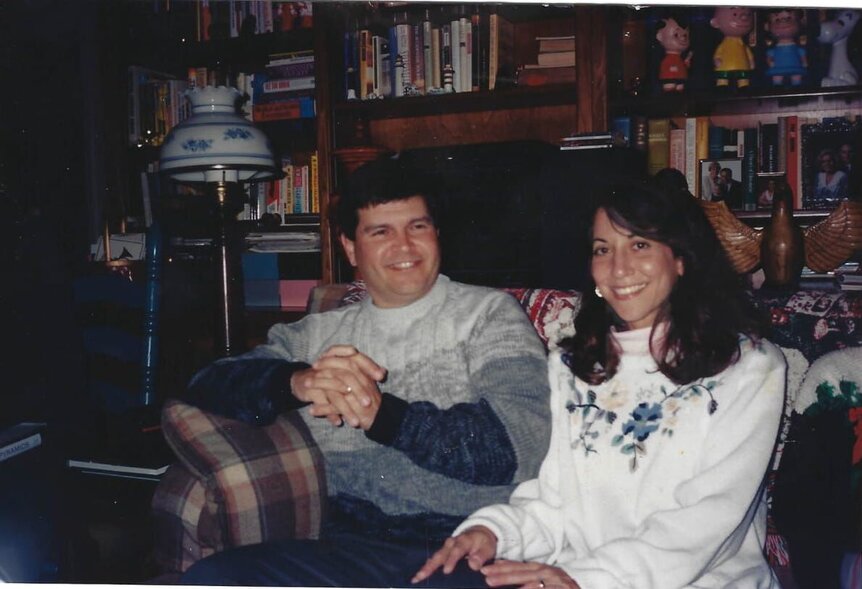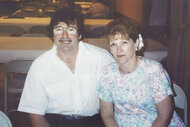Create a free profile to get unlimited access to exclusive videos, breaking news, sweepstakes, and more!
This Georgia College Professor Didn’t Kill His Wife — So Why Did He Tell Police He Could Have?
“I don’t know if anybody else knows there’s a Walter No. 2,” Walt Mason told investigators after the brutal murder of his wife. The only problem was, Walt didn’t have a split personality — and he didn’t kill his wife.

On April 29, 2002, Walt Mason was at Walmart buying cotton candy for his wife while she was being chased through the house, naked, then stabbed in the throat. The kids were playing in the bathtub.
Mason would return to his Swainsboro, Georgia, home that night to find his wife dead. Portions of his chilling call to 911 are played on this week’s episode of “Injustice With Nancy Grace” — Mason’s voice cracks in a register beyond terror, as he tells the operator that his wife, Emily, is “laying naked on the floor, and she’s dead.”
Veteran prosecutor and television analyst Nancy Grace says she decided to dive into the Mason case because of the injustices heaped upon Walt, who was quickly arrested and charged with his wife’s murder — while the actual killer wouldn’t face justice for almost 15 years.
In the days immediately following his wife’s murder, however, Walt Mason didn’t do himself many favors when speaking with police. Under intense questioning, Walt made the decidedly odd remark that “if” he had killed his wife, “it was someone else inside me.”
Why would he say such a thing, though?
Special Agent John Durden, with the George Bureau of Investigation, was a neighbor of Walt’s, and conducted his interrogation. Walt failed his polygraph test, Durden recalled to producers of “Injustice,” and once the multiple-personality topic was breached, authorities were confident they had their killer.
“It’s beyond my grasp, I guess, to explain why he said what he said,” Durden told producers.
As seen on “Injustice,” Walt seems to agree with Durden during the interrogation that it’s possible another side of his personality killed his wife.
“I don’t know if anybody else knows there’s a Walter No. 2,” Walt says at one point.
Even more chilling, later, Walt tells Durden that, “if” he did it, he would have used a knife from the kitchen butcher block, then put it in the dishwasher after, because Emily “didn’t want knives in the dishwasher.”
Emily’s actual killer also did leave the likely murder weapon in the dishwasher, which further convinced authorities of Walt’s guilt.
“It was kind of a spine-tingling moment,” Durden told “Injustice” producers. “I thought, ‘I’m talking to the person who did this.’”
In 2017, during the trial of Emily’s actual killer, defense attorney Matt Hube pressed Walt on his split-personality admissions in the wake of his wife’s murder, according to local affiliate WTOC.
“I said, ‘If I did this, it had to be another me that did it,’” Walt told Hube, according to WTOC. “That’s where the second one came from.”
Later, during Hube’s questioning, Walt said, “There is no ‘Walt 2.’”
A number of factors can congeal to cause an innocent person to make a false confession or incriminating statement under interrogation, according to research done by the legal non-profit The Innocence Project.
Exhaustion, stress, hunger, substance abuse or even limited education can all push someone toward confessing to something they didn’t do. In Walter Mason’s case, it remains unclear why he made the incriminating statements about a possible split personality.
“It’s not just one kind of person who gives a false confession,” The Innocence Project’s Saul Kassin, an expert in the field and professor of psychology told Al-Jazeera in March. “We are all vulnerable under the circumstances of interrogation.”
Oftentimes innocent suspects will also give false statements, believing that if they don’t confess, they will be given a harsher punishment, according to the Innocence Project.
At the time of Walt’s interrogation, Durden believed that Walt may have been trying to starting a “mental-defect defense,” Durden told “Injustice” producers — he believed he was hoping for a not-guilty verdict by reason of insanity.
The only problem was, the evidence at the crime scene didn’t support the notion of “Walt 2” killing his wife.
To hear the whole story of Emily Mason’s murder, who really killed her and the 15-year journey toward justice, watch the latest episode of “Injustice With Nancy Grace” on Oxygen.com, and catch new episodes Sundays at 6 p.m. ET/PT.






























